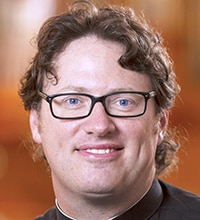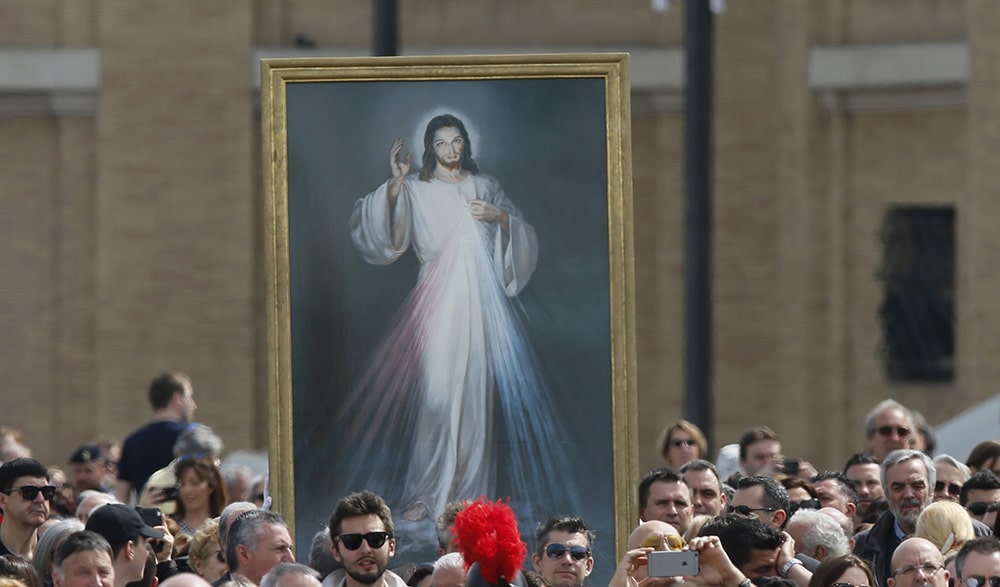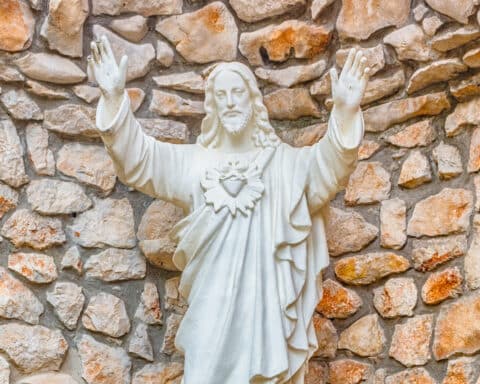
Death, having done its worst on Friday, was defeated on Sunday. Rising from the tomb, Jesus “dies no more; death no longer has power over him” (Rom 6:9). The worst did not win; the worst did not have the last word. Rather, Jesus did. Out of the tomb, speaking first to a lovingly confused Mary Magdalene, the Risen Christ changed the ending — that is, he did away with endings altogether. Life continues, and more beautifully than before — that’s resurrection. It’s life after death. Which, again, is like mercy. It allows life to continue.
It’s significant that as Jesus said “Peace be with you,” he at the same time showed his wounds. Standing before the disciples — one of whom betrayed him; most of whom scattered — Jesus offers his peace in return for their weakness. Risen, he offers them mercy. He doesn’t push them away; he goes to them, even through a locked door. Jesus doesn’t give up on them even though they gave up on him. He died, but he lives. Thus, he offers peace. It’s a divine mercy that our worst can’t conquer.
| April 24 – Second Sunday of Easter, Sunday of Divine Mercy |
|---|
|
Acts 5:12-16 |
Such is the simple truth of Divine Mercy. That Jesus rose from the dead and “ascended into heaven and is seated at the right hand of the Father,” as we say in the Nicene Creed, means that his willingness to forgive is like his nature — divine, eternal, more than capable of forgiving the worst sins. It means that God will never be the one to abandon us; since Eden, God has sought us out (cf. Gn 3:9). Risen from the dead, God in Christ seeks us out just as he’s always done.
Divine Mercy is nothing new; it’s eternal. It’s just that the Resurrection brings such mercy close to us, to our wounds. Jesus wants us to touch his risen wounds, almost as if to say that God’s love touches all wounds — his and ours. This is a gift of Easter, the revelation of God’s forgiveness at the sites of wounds — Christ’s, mine and yours. It means that, in Christ, we mustn’t give up on each other, no matter the wounds. It means mercy must touch our wounds. Because mercy makes for redemption (cf. Col 1:14). It’s the beginning of God making all things new (Rv 21:5). It’s the tragedy of Eden made into the miracle of the new Jerusalem.
And so, the questions are simple. Do we intend to participate in such mercy? Can we accept that such mercy is indeed meant for us? Can we receive Divine Mercy, believing that God has indeed forgiven us? Or do we scrupulously doubt the divinity of Christ’s mercy? Do we doubt the priest’s absolution? As a pastor, I can tell you that these are very real questions. Is Divine Mercy divine enough for me? The answer is yes, of course; but it takes faith to believe it sometimes. So, if that’s you, pray for that faith.
But know, too, that the fruit of mercy is mercifulness. As God did not abandon us, the followers of Jesus mustn’t abandon each other. This, undoubtedly, can be at times profoundly difficult. For instance, must the wounded return to their wounders? What about the abused? The challenge of mercy can become quite scary quite fast. But still, the challenge remains: The mercy of the Lord is everlasting, and our mercy must follow the Lord’s. Certainly, that doesn’t mean one is called to remain perpetually victim; Jesus didn’t, as he rose from the dead! But, of course, that was a miracle. And so, maybe the mercy we practice in our lives will at times have to be miraculous, too.
Maybe mercy must always be divine. Maybe that’s why the Church repeatedly reminds us that we live in Christ by faith and sacraments — to make mercy possible. And maybe that’s why Easter matters. It shows us where mercy begins — in Christ’s resurrection and ours.
Father Joshua J. Whitfield is pastor of St. Rita Catholic Community in Dallas and author of “The Crisis of Bad Preaching” (Ave Maria Press, $17.95) and other books.





